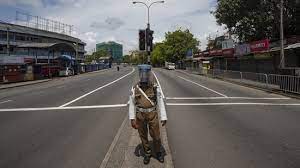The Sri Lankan Government must stop harassing and threatening journalists, government officials, doctors and social media users with legal actions for criticizing the State response to COVID-19, said the ICJ today.
Former Spokesperson of the Health Ministry Dr. Jayaruwan Bandara was summoned by the Criminal Investigation Department (CID) on 31 August regarding comments he made in a television interview on the high prices of COVID-19 tests and the general handling of the pandemic. Previously, Dr. Najith Indika was also questioned by the CID for posting critical remarks on Facebook about the crisis at the Avisawella Hospital due to the increasing number of COVID-19 patients.
In April 2020 and subsequently in June 2021, the Police authorities announced that they would arrest those who spread false or derogating statements about officials combating the spread of the Covid-19 virus pursuant to provisions in the Computer Crimes Act (CCA), the Police Ordinance and Penal Code.
Several arrests have since been undertaken for posting allegedly false content on social media. This included the arrest of a university student who was subsequently detained for over a week for allegedly spreading a rumour that a special quarantine centre had been built for VIPs.
Sri Lanka presently does not have laws directly dealing with ‘fake news’ or false content online. Overbroad and poorly worded provisions of the Police Ordinance relating to ‘creating panic’, the CCA relating to ‘causing danger to public order’ and the Penal code regarding ‘exciting dissatisfaction’ are being misused to silence dissenters. It is noteworthy that most of these are cognizable offences that do not require an arrest warrant under Sri Lankan Law.
“The government’s intimidation of people who raises question about measures to respond to Covid-19 serve to undermine, not advance, efforts to stop the spread of the pandemic,” said Ian Seiderman, ICJ’s Legal and Policy Director. “The Sri Lankan government seems to be misusing regulations adopted to combat Covid-19 as a yet another means to restrict freedom of expression and information. This is a continuation of practices spanning far earlier than the beginning of the COVID-19 pandemic.”
The right to freedom of expression is protected by Article 19 of the International Covenant on Civil and Political Rights (ICCPR) and by Article 14 of the Sri Lankan Constitution. While article 19 allows for some restriction of the right to meet a public health emergency, any restriction must be necessary and proportionate to the aim of protecting public health.
The UN Human Rights Committee has emphasized that “freedom of expression, access to information, and a civic space where a public debate can be held constitute important safeguards” for the appropriate application of emergency responses by States in the context of the COVID-19 pandemic.
While there is a legitimate need to counter the spread of misinformation to protect public health during a pandemic, this objective must be provided by a clear and accessible law and pursued using the least intrusive means, rather than unnecessary and disproportionate measures, such as unwarranted arrests and police intimidation.
“The intimidation of government critics with the excuse of Covid-19 restrictions not only contravenes Sri Lanka’s international legal obligation to respect the right to freedom of expression and information, but it also undermines the right to health and the obligation to ensure access to health-related information and enable people to seek, receive and share information and ideas concerning health issues,” Seiderman said.
Background Information
Please find below some of ICJ’s recent coverage on related issues:
- https://www.icj.org/wp-content/uploads/2020/09/Universal-Global-Health-COVID-19-Publications-Reports-Thematic-Reports-2020-ENG.pdf(Section VI, p 104 onwards)
- https://www.icj.org/wp-content/uploads/2021/05/Africa-The-Unvaccinated-Publications-Reports-2021-ENG.pdf
- https://www.icj.org/wp-content/uploads/2019/12/Southeast-Asia-Dictating-the-Internet-Publications-Reports-Thematic-reports-2019-ENG.pdf
- https://www.icj.org/thailand-new-icj-report-highlights-intensified-online-restrictions/; https://www.icj.org/thailand-covid-19-response-measures-must-not-undermine-freedom-of-expression-and-information/; https://www.icj.org/thailand-immediately-repeal-emergency-regulation-that-threatens-online-free-doms/
Contact
Osama Motiwala, ICJ Asia-Pacific Communications Officer, t: +66-62-702-6369 e: osama.motiwala(a)icj.org




